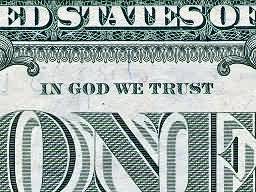NEWDOW'S SUIT REJECTED--THANK GOD!!
 Here in River City, capitol of "The People's Republic of California," we have an abundance of whackjobs. Michael Newdow, both a lawyer and doctor, is near the head of the line.
Here in River City, capitol of "The People's Republic of California," we have an abundance of whackjobs. Michael Newdow, both a lawyer and doctor, is near the head of the line.Newdow has a problem with our nation's pledge--"under God"--as well as "In God we trust," which is placed on our coins and currency. Newdow's latest efforts are to have "In God we trust" removed from our money, because...well, because he's an idiot. You'd think a man who's both a lawyer and a doctor would at least consider the highest and best use of his time.
From today's Sacramento Bee:
A Sacramento federal judge on Monday tossed out atheist Michael Newdow's challenge to the phrase "In God We Trust" as the national motto and its inscription on coins and currency.
Newdow argued that the slogan violates the establishment clause of the U.S. Constitution, which keeps government out of religion.
But U.S. District Judge Frank C. Damrell Jr. points out in an 18-page order that the federal appellate court with jurisdiction over California held in a 1970 opinion that the motto "has nothing whatsoever to do with the establishment of religion."
"Its use is of a patriotic or ceremonial character and bears no true resemblance to a governmental sponsorship of a religious exercise," the 9th U.S. Circuit Court of Appeals ruled then.
Newdow argued that the case cited by Damrell was "wrongly decided."
"Wrongly decided or not," the judge wrote, "this court must, and does here, follow 9th Circuit precedent."
The same appellate opinion disposes of Newdow's claim that the use of the motto on coins and currency amounts to government coercion to proselytize or evangelize on behalf of monotheism, Damrell wrote.
Newdow said Monday he is optimistic about his chances on appeal to the 9th Circuit.
Noting that Damrell reached his decision without oral argument, he said, "Now I won't have to pay for a transcript, so it's even better than I had hoped for."
Newdow, a non-practicing attorney who makes his living as an emergency room physician, argued that a 1977 U.S. Supreme Court decision supports his contention that the makeup of U.S. money burdens his right to freely exercise his atheistic beliefs.
In that case, the high court held that New Hampshire could not require citizens to display the state motto, "Live Free or Die," on their vehicle license plates.
The court noted that New Hampshire law required motorists "to participate in the dissemination of an ideological message by displaying it on ... private property in a manner and for the express purpose that it may be observed and read by the public."
The court ruled that New Hampshire's citizens were protected from the state law's provisions by the First Amendment, which guarantees the right to hold a viewpoint different from the majority and to refuse to foster an objectionable idea.
"However," Damrell pointed out, "the Supreme Court made clear ... it did not intend that this analysis be read as sanctioning the obliteration of the national motto from United States coins and currency."
The judge quoted from the high court's decision:
"Currency, which is passed from hand to hand, differs in significant respects from an automobile, which is readily associated with its operator. Currency is generally carried in a purse or pocket and need not be displayed to the public. The bearer of currency is thus not required to publicly advertise the national motto."
Damrell thus dismissed Newdow's lawsuit, concluding he has no viable claim that the motto and its presence on money "constitutes a substantial burden on the exercise of his religious beliefs."
Next case.



<< Home